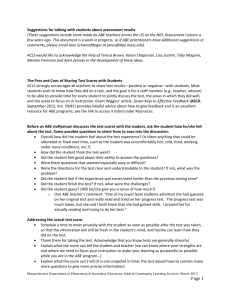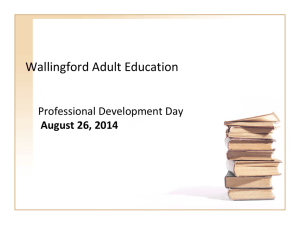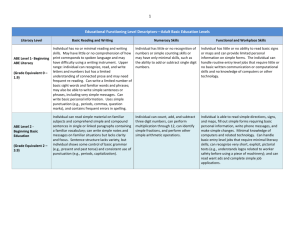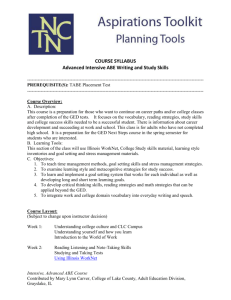GR5 WK12 1.6.11
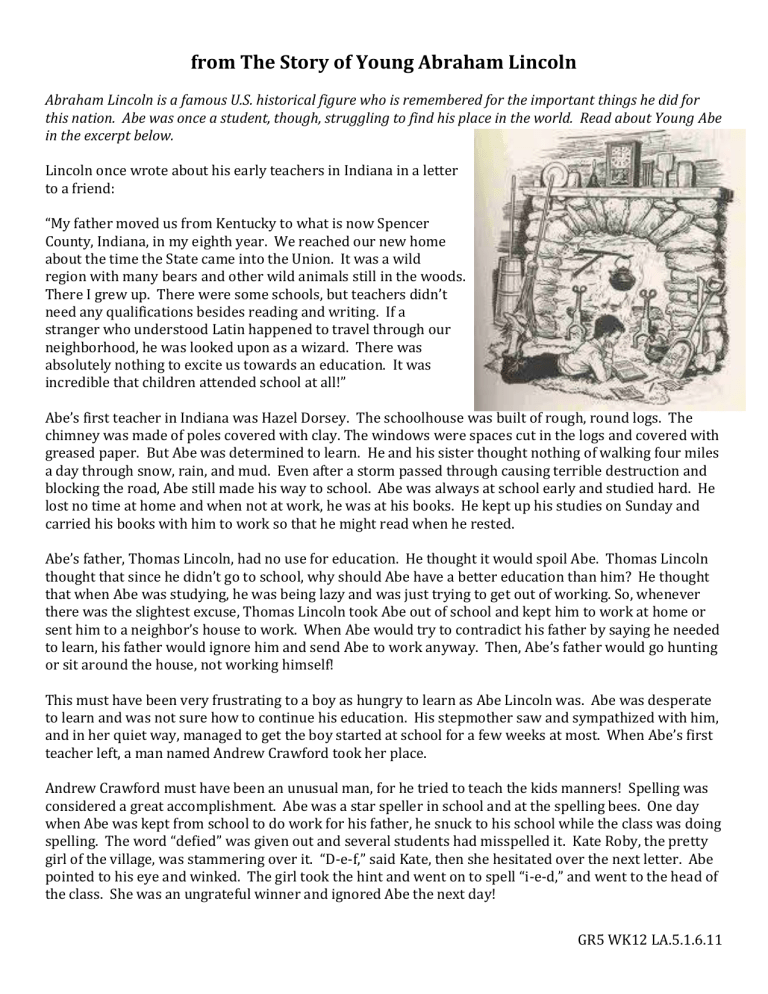
from The Story of Young Abraham Lincoln
Abraham Lincoln is a famous U.S. historical figure who is remembered for the important things he did for this nation. Abe was once a student, though, struggling to find his place in the world. Read about Young Abe in the excerpt below.
Lincoln once wrote about his early teachers in Indiana in a letter to a friend:
“My father moved us from Kentucky to what is now Spencer
County, Indiana, in my eighth year. We reached our new home about the time the State came into the Union. It was a wild region with many bears and other wild animals still in the woods.
There I grew up. There were some schools, but teachers didn’t need any qualifications besides reading and writing. If a stranger who understood Latin happened to travel through our neighborhood, he was looked upon as a wizard. There was absolutely nothing to excite us towards an education. It was incredible that children attended school at all!”
Abe’s first teacher in Indiana was Hazel Dorsey. The schoolhouse was built of rough, round logs. The chimney was made of poles covered with clay. The windows were spaces cut in the logs and covered with greased paper. But Abe was determined to learn. He and his sister thought nothing of walking four miles a day through snow, rain, and mud. Even after a storm passed through causing terrible destruction and blocking the road, Abe still made his way to school. Abe was always at school early and studied hard. He lost no time at home and when not at work, he was at his books. He kept up his studies on Sunday and carried his books with him to work so that he might read when he rested.
Abe’s father, Thomas Lincoln, had no use for education. He thought it would spoil Abe. Thomas Lincoln thought that since he didn’t go to school, why should Abe have a better education than him? He thought that when Abe was studying, he was being lazy and was just trying to get out of working. So, whenever there was the slightest excuse, Thomas Lincoln took Abe out of school and kept him to work at home or sent him to a neighbor’s house to work. When Abe would try to contradict his father by saying he needed to learn, his father would ignore him and send Abe to work anyway. Then, Abe’s father would go hunting or sit around the house, not working himself!
This must have been very frustrating to a boy as hungry to learn as Abe Lincoln was. Abe was desperate to learn and was not sure how to continue his education. His stepmother saw and sympathized with him, and in her quiet way, managed to get the boy started at school for a few weeks at most. When Abe’s first teacher left, a man named Andrew Crawford took her place.
Andrew Crawford must have been an unusual man, for he tried to teach the kids manners! Spelling was considered a great accomplishment. Abe was a star speller in school and at the spelling bees. One day when Abe was kept from school to do work for his father, he snuck to his school while the class was doing spelling. The word “defied” was given out and several students had misspelled it. Kate Roby, the pretty girl of the village, was stammering over it. “D-e-f,” said Kate, then she hesitated over the next letter. Abe pointed to his eye and winked. The girl took the hint and went on to spell “i-e-d,” and went to the head of the class. She was an ungrateful winner and ignored Abe the next day!
GR5 WK12 LA.5.1.6.11
1.
Read these sentences from the passage.
There was absolutely nothing to excite us towards an education. It was incredible that children attended school at all!
The word incredible comes from the Latin root –cred meaning “believe.” What does the word
incredible mean?
A.
able to consider
B.
a feeling of trust
C.
wanting to understand
D.
not easy to accept as true
2.
Read this sentence from the passage.
Even after a storm passed through causing terrible destruction and blocking the road, Abe still made his way to school.
The word destruction comes from the Latin root –struct meaning “to build.” What does the word
destruction mean?
A.
falling apart
B.
stop creating
C.
slow walking
D.
putting together
3.
Read this sentence from the passage.
When Abe would try to contradict his father by staying he needed to learn, his father would ignore him and send Abe to work anyway.
The word contradict comes from the Latin root –dict meaning “to speak.” What does the word
contradict mean?
A.
thinking deeply
B.
talking very loudly
C.
sharing the same opinion
D.
expressing a disagreement
GR5 WK12 LA.5.1.6.11
4.
Read this sentence from the passage.
Abe was desperate to learn and was not sure how to continue his education.
The word desperate comes from the Latin root –sper meaning “hope.” What does the word
desperate mean?
A.
full of hope
B.
without hope
C.
to hope again
D.
be the first to hope
5.
Read these sentences from the passage.
The girl took the hint and went on to spell “i-e-d,” and went to the head of the class.
She was an ungrateful winner and ignored Abe the next day!
The word ungrateful comes from the Greek root –grat meaning “thank”. What does the word
ungrateful mean?
A.
out of ideas
B.
full of pleasure
C.
not appreciative
D.
pay no attention to
6.
Who was Abe Lincoln’s teacher before Andrew Crawford?
A.
Kate Roby
B.
his father
C.
Hazel Dorsey
D.
Andrew Crawford
7.
Read this sentence from the passage.
His stepmother saw and sympathized with him, and in her quiet way, managed to get the boy started at school for a few weeks at most.
What does the word sympathized mean as used in the sentence above?
A.
ignored him
B.
educated him
C.
felt sorry for him
D.
disapproved of him
GR5 WK12 LA.5.1.6.11
8.
With which statement would the author most likely agree?
A.
Abe Lincoln could have worked harder at spelling.
B.
Abe Lincoln had a strong desire for education.
C.
Abe Lincoln needed to have better teachers.
D.
Abe Lincoln should have obeyed his father.
9.
Which sentence from the passage best explains the illustration?
A.
The chimney was made of poles covered with clay.
B.
He lost no time at home and when not at work, he was at his books.
C.
It was a wild region with many bears and other wild animals still in the woods.
D.
He and his sister thought nothing of walking four miles a day through snow, rain, and mud.
10.
What is Abe Lincoln’s main problem in the passage?
A.
His teachers were not educated enough.
B.
He had to walk too far to school in bad weather.
C.
He had to move to another state while he was young.
D.
His father thought he should work and not attend school.
GR5 WK12 LA.5.1.6.11
Answer Key
1.
Correct answer is D DOK 2
2.
Correct answer is A DOK 2
3.
Correct answer is D DOK 2
4.
Correct answer is B DOK 2
5.
Correct answer is C DOK 2
6.
Correct answer is C DOK 1
7.
Correct answer is C DOK 2
8.
Correct answer is B DOK 2
9.
Correct answer is B DOK 2
10.
Correct answer is D DOK 2
GR5 WK12 LA.5.1.6.11




